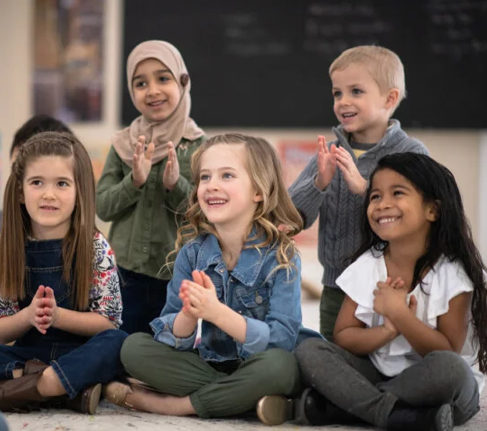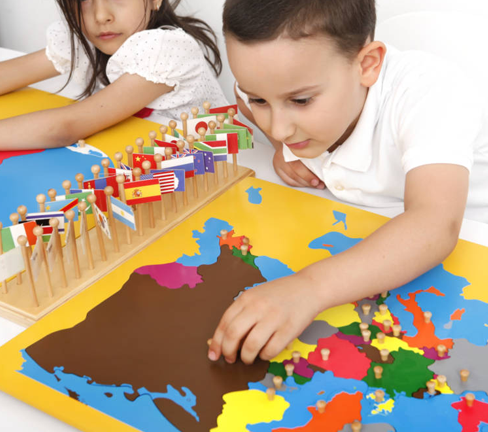
Blooming Brains at a Glance


BBA Infant Community
(6 weeks-18 months)
Our infant community is intentionally staffed at a low student to teacher ratio to ensure that each individual childs needs are met in the manner intended by Maria Montessori. When it comes to Infants, Montessori is focused on three main areas: sleep, eating and movement. When you enter a Montessori infant community, the main difference you will notice is that children are not contained within bouncy seats or walkers. Instead, they are provided with spaces throughout the environment that suit their physical needs at each given point in their development.
For example, children who have yet to begin crawling will find a comfortable space next to a floor mirror, accompanied by various mobiles and age appropriate toys where they will spend supervised time with their teachers.
Children will have the ability to eat and sleep as their individual schedules demand. As children grow and have the ability to move, feed independently and speak, their teachers will guide them, all the while, following their lead.
Children graduate from the infant community after they meet certain developmental milestones and when they can independently walk and perform other tasks, all of which generally occurs after 18-months of age.
BBA Toddler Community
(19 months-36 months)
At BBA, our Toddlers focus on movement, toilet training, and vocabulary building. Sensory experiences are also at the core of this dynamic program.
Curricularly, students begin study of sounds and vocabulary. Daily vocabulary introductions progress through a thoughtfully planned curriculum that mirrors the Geography and Culture lessons in the Preschool program. For example, explorations of the animals of North America would coincide with the month of November, whereas Preschool communities are focused on studying the continent, animals, and cultural traditions celebrated in the countries of North America.


The development and strengthening of the hands is an essential part of the Montessori Toddler curriculum. You’ll observe students working on activities rooted in classification, sensory exploration and executive functions.
We partner with parents when the readiness for toilet training presents itself, and help guide parents through the process! We help with everything from selecting the perfect child friendly toileting seat to teaching you the child-centered approach we use within the classroom for use in your home. We are truly your partners in this process!


BBA Pre Primary Community
(36 months-72 months)
All traditional Montessori preschool classroom communities are thoughtfully divided into the areas Maria Montessori set forth in her scientific approach to education. In the classroom, each of the five areas: math, language, everyday living (or practical life), sensorial exploration, and geography and culture, has a distinct place.
Math: The math materials are beautiful, inviting and lay the foundation for a concrete understanding of numeration and quantification that can later be applied and used to perform basic operations of math (addition, subtraction, multiplication and division).
Our golden bead material is representative of place value, and the colored beads provide experience with skip counting, multiples, and the concepts of squaring and cubing.
Language: The language shelves contain sets of sandpaper letters, carefully divided into groups used to lay the foundation for reading through phonics. Identifying beginning, middle, and ending sounds of simple words, word building with the moveable alphabet, and matching objects to sounds are all features of the Montessori language curriculum.
Everyday living/ practical life: This area refers to those activities necessary for just that, living life every day. Students learn to pour, scoop and use tongs. They learn to fold clothing, scrub a table, wash windows or mirrors, scrub pennies, polish silverware and, one of the most important works of all… wash their hands. These skills help children learn how to contribute at home and helps them to understand their role in a community. They teach responsibility and give children an opportunity to contribute in a meaningful way, thereby raising their self-value and confidence.
Sensorial: In the sensorial area of the classroom, students are exposed to activities and experiences that involve the senses. Experiences with color, shape, form, texture, taste, smell and weight are all provided throughout the school year in this area of the room.
Concurrent with the children’s movement through the aforementioned areas of the classroom comes the study of science, peace education, geography, and culture.
BBA Elementary Community
(1st grade-5th Grade)
The elementary Montessori curriculum includes a robust exploration of math, grammar, spelling, geography, culture, history, science and cosmic education. Cosmic education is the term Montessori referred to as the path through which children develop a global vision and come to show gratitude for the universe and their place within it. This is achieved through the experiences of The Five Great Lessons, which launch the framework for all areas of study within the Montessori elementary classroom.


Students produce projects and artifacts that demonstrate their learning, many of which include presentations and performances. The class is multiage, allowing students to learn from and with peers at different stages of development. Additionally, students are given materials that match their skills so that each one can continually be challenged to meet his/her potential.
Many Montessori students perform above grade level, especially those who have been with Montessori education for many years. Content is taught in a manner that allows for foundational and conceptual learning, which allows students to grasp more challenging concepts with ease.
At BBA, we strive to offer opportunities for every student to achieve and are not limited by any age-based barriers. Our staff includes teachers who are able to teach high levels of math and literature (including high school content) so that we can meet every students needs. Our structured, supportive approach encourages students to do their best and seek our challenges. We look forward to giving your child an advanced start and helping them stay ahead of the pack!
 2111 Cass Lake Road
2111 Cass Lake Road 248.590.2274
248.590.2274 info@bloomingbrainsacademy.com
info@bloomingbrainsacademy.com

